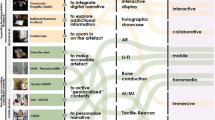Abstract
The glut of information produced by ubiquitous computing in augmented reality environments requires that the resulting information displays be tailored to the attention of users and mapped directly to the objects and surfaces of the space. This paper proposes a method for designing and implementing ambient information displays combining ambient displays and augmented reality to produce useful intuitive interfaces that are concretely mapped to architectural spaces for the purposes of expanding and enriching the quality and sensuality of user experience.
Chapter PDF
Similar content being viewed by others
Keywords
- Augmented Reality
- Ubiquitous Computing
- Information Display
- Ambient Interface
- Augmented Reality Environment
These keywords were added by machine and not by the authors. This process is experimental and the keywords may be updated as the learning algorithm improves.
References
Ambient Devices: http://www.ambientdevices.com
Ishii, H., Ren, S., Frei, P.: Pinwheels: Visualizing Information Flow in an Architectural Space (short paper). In: Proc. CHI 2001, pp. 111–112 (2001)
Ju, W., et al.: Counteractive: An Interactive Cookbook for the Kitchen Counter. In: Extended Abstracts CHI 2001, pp. 269–270 (2001)
Kaye, J.N. (2001) Symbolic Olfactory Display. Master’s Thesis, MIT Media Lab (2001)
Microsoft Kitchen of the Future as seen in the Food Network’s documentary Kitchens of the Future (2003)
Wellner, P.: The DigitalDesk calculator: Tangible Manipulation on a Desk Top Display. In: Proc. UIST 1991, pp. 27–34 (1991)
Author information
Authors and Affiliations
Editor information
Editors and Affiliations
Rights and permissions
Copyright information
© 2005 IFIP International Federation for Information Processing
About this paper
Cite this paper
Bonanni, L., Lee, CH., Selker, T. (2005). Cooking with the Elements: Intuitive Immersive Interfaces for Augmented Reality Environments. In: Costabile, M.F., Paternò, F. (eds) Human-Computer Interaction - INTERACT 2005. INTERACT 2005. Lecture Notes in Computer Science, vol 3585. Springer, Berlin, Heidelberg. https://doi.org/10.1007/11555261_95
Download citation
DOI: https://doi.org/10.1007/11555261_95
Publisher Name: Springer, Berlin, Heidelberg
Print ISBN: 978-3-540-28943-2
Online ISBN: 978-3-540-31722-7
eBook Packages: Computer ScienceComputer Science (R0)




